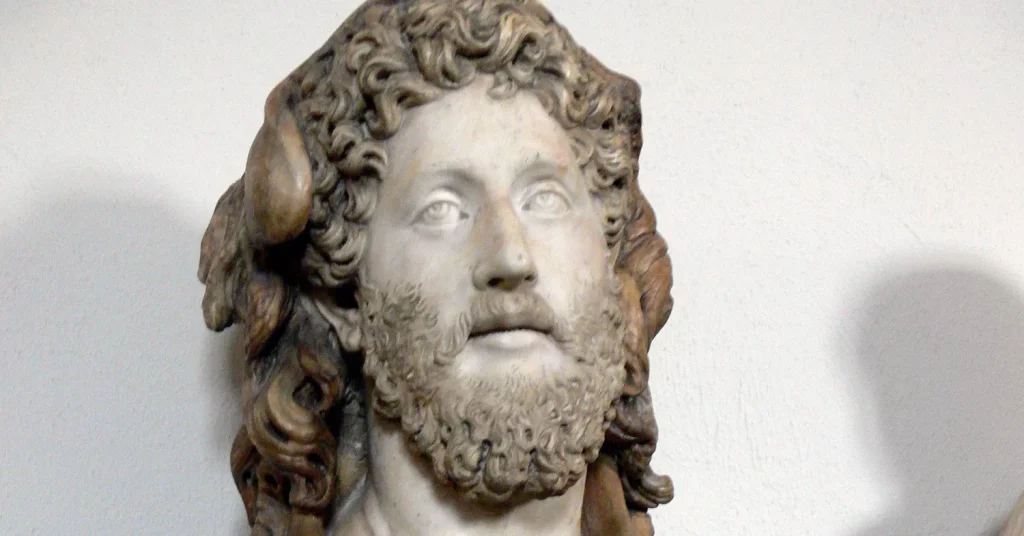Last updated on July 22nd, 2022 at 07:23 pm
If Emperor Commodus were to be remembered as one thing, it’d likely be a man of many. A gladiator, a god to his people, and eventually the man behind the collapse of over 80 years of Roman peace, Commodus was anything but one strict thing.
Commodus, the son of the famous Emperor Marcus Aurelius, lived an interesting life, combining 15 years of rule alongside his father with 16 years of chaos. Thrown into the spotlight as Rome’s then youngest emperor ever, at the age of 15, Commodus had anything but an easy start to his rule over the Roman Empire.
Nonetheless, he’s managed to leave quite a name for himself, pushing the world of Rome from “a kingdom of gold to one of iron and rust,” a famous view from Roman historian Dio Cassius. No matter what way you view him, whether as a famous figure or one of infamy, it’s not hard to say he lived an interesting life. And so, here’s that life, the life of Emperor Commodus.

A Childhood of Royalty
Immediately after his birth on August 31st, 161AD, Commodus, full name Caesar Marcus Aurelius Commodus Antoninus Augustus, was thrown into the spotlight. He was the legitimate son of Marcus Aurelius and Aurelius’ first cousin, Faustina the Younger, and was a significant figure within just years.
By the time Commodus was 6, he had already been made Caesar alongside his younger brother, taking the role on October 12th, 166. Within another three years, he was the sole son of Marcus Aurelius, following his twin brother’s death in 165 and his younger brother’s death in 169.
In 176, Commodus became co-ruler, proclaimed by his father to be join-emperor and the official heir to the emperor, joining him in invading German tribes along the Danube River before Aurelius’ death in March 180.
By 180, Commodus, just 19 years old, took over leadership of the entire Roman Empire following his father’s death at the hands of the plague. Almost immediately, Commodus did things quickly and differently, coming to terms with the Germans before changing his name to Marcus Aurelius Commodus Antoninus.
A Life of Struggle
Although Commodus had served alongside Marcus Aurelius for the few years before his ascension to the head of the Roman Empire, he did things very differently once in power. A great example would be his quick devaluation of the denarius, the official Roman currency, the largest such since the first cut to its value in Nero’s reign over the empire.
Commodus’ reign would be marked by odd decisions like these, ones that were oftentimes disagreed upon by his close followers and the majority of his people, although ones he made, nonetheless. Fortunately, however, those decisions weren’t all negative – in fact, Commodus’ rule resulted in a drastic decrease in military excursion and fights when compared to his father’s.
Still, things quickly went downhill. Just a teenager, and the youngest one yet, at that, Commodus was the target of an assassination, one by family at that. In conspiracy with a group of senators displeased by Commodus’ political choices, his sister Lucilla attempted to assassinate Commodus in 182 to cut off the head of the empire before it led to its downfall. The plan was to kill Commodus as he entered a theater, but nope.
Unluckily for the group, the assassination failed, and Commodus, yet again just age 21, executed several senators as retaliation. Even more unfortunately for the people, this assassination attempt pushed Commodus down a path of growing viciousness and poor decisions.
Four years later, in 186, Commodus executed his chief minister at the request of his army. By this time, although he had not led the empire to war, Commodus grew to favor and listen to the army, choosing to appeal to them over the growing dissatisfaction of his own people.
This growing ignorance of what the masses wanted led to much political discourse, pushing many more conspiracies, coups, and attempted assassinations, each of which failed and led to a more dictatorial Commodus.
As chaos continued to grow gradually, more and more of his political enemies attempted to rise to power, to then be taken out by Commodus’ soldiers by execution. A significant example is Cleander, a favorite of Commodus, who rose to become the leader of the Praetorian guard and the man behind a string of political office sales to the highest bidder.
Similar stories to these popped up over the years of Commodus’ rule, each of which ended with an assassination, execution for treason, or political exile. As more and more attempts against his life and political office appeared, Commodus gradually fell into a state of perpetual distrust, with the ruler sinking into insanity.
The End of an Era
By 29 years old, Commodus had fully committed to independent rule. He ignored the Senate, ruling as a figure blessed by god-like power – beliefs bolstered by repeated assassination attempts survivals.
He set up statues around the empire of him representing Hercules, pushing many steadfast followers into believing that Commodus was blessed by gods, suited with superhuman strength, freedom, and abilities. Commodus eventually claimed to be the son of Jupiter, insisting on bringing about a new order and era of the Roman Empire.
That’s in stark contrast to the massive fire that swept through the city of Rome just a year later, destroying many important landmarks and buildings. Nonetheless, in 192, the next year, Commodus declared himself the next Romulus, reestablishing Rome as Colonia Lucia Annia Commodiana, otherwise known as the Colony of Commodus.
Now mad with power, Commodus began fighting in gladiatorial arenas against both fighters and lions. Building off his beliefs of being Hercules, son of Jupiter, Commodus started to imagine he was a god, replacing the head of the Colossus of Nero with his own. Going further, he also gave the statue a club, a bronze lion, and wrote into the statue (now representing Hercules), “the only left-handed fighter to conquer twelve times one thousand men.”
In November 192, Commodus arranged the Plebeian Games, where he killed hundreds of animals and won daily fights as a gladiator. The next month, on December 30th, he announced his intention to start the year 193 as consul and gladiator. Alongside that intention, Commodus created a list of the people he planned to have executed once he gained further power.
On that list was Commodus’ mistress, Marcia Aurelia Ceionia Demetrias, alongside prefect Laetus and Eclectus. Done with Commodus’ dive into insanity and plan to absolute power, the trio decided to poison him in a plan to finally end his rule and gradual destruction of Pax Romana, the nearly 100-year-long period of peace.
Unfortunately, Commodus vomited the food, surviving yet another assassination attempt. Nonetheless, the trio wasn’t done – rather, they simply sent Commodus’ wrestling partner, Narcissus, to Commodus while he was bathing, strangling him while in the bath.
After Death
Once the Senate learned of Commodus’ assassination, they ruled him a public enemy prior to reestablishing Rome and the surrounding areas. As a result, all his statues were demolished, his body was buried, and the Year of Five Emperors began, creating more than a few additional years of trouble and misfortune to come.
Three years after his death on December 31st, 192, Emperor Septimius Severus had Commodus rehabilitated, memory-wise, alongside bringing the Senate to deify him in an attempt to reconnect and gain political favor with the family of Marcus Aurelius, of which Commodus was born into.
Today, we recognize him as a man driven by political envy and dissolution to insanity, bringing the Pax Romana period to an end.
Atop poor decisions, Commodus was thrust into the spotlight too early, pushing his beliefs of being a god and having superhuman abilities, which eventually led to his downfall at the hand of his mistress and friends.

